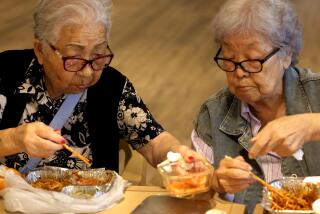$100-Million Complex in Little Tokyo Proposed
- Share via
A New York-based nonprofit group is spearheading plans to convert seven acres of Little Tokyo parking space into a $100-million retail and residential neighborhood that would include a food museum, a spa and a sake tasting room.
Los Angeles officials hope the attractions will bolster flagging tourism downtown.
The Little Tokyo Cultural Marketplace also would include condominiums for as many as 200 families. It could lure thousands of visitors for shopping, dining and classes in everything from origami to tea ceremony, according to a proposal submitted to the Los Angeles Community Redevelopment Agency.
“It’s one of the most exciting ideas . . . in a long time,” said Don Spivack, the CRA’s deputy administrator.
The CRA has committed $75,000 to help pay for a $275,000 study of the proposal. The study, expected to be completed in about 10 months, would examine project costs, funding sources, possible tenants and preliminary designs. The project is expected to take five to 10 years to complete.
The Cultural Marketplace proposal is being led by Project 180, a nonprofit group that coordinates joint public and private ventures that promote cultural activities as tourist destinations. The group will arrange funding for the study and seek investors.
Project 180 is working with the CRA, the Japanese American Cultural and Community Center and the Senshin Buddhist Temple. Their concept is to build an urban village on the expanse of parking lots bordered by 2nd, 3rd, San Pedro and Los Angeles streets in the southwest corner of Little Tokyo.
The CRA is keen on developing that area, near St. Vibiana’s Cathedral. The proposed Cultural Marketplace would link Little Tokyo to the core of the Civic Center, the toy district and Bunker Hill.
Just as the French Quarter in New Orleans draws tourists to surrounding neighborhoods, the proposed marketplace would attract visitors to the rest of Little Tokyo, according to an initial 100-page feasibility study prepared for Project 180 by ALW Associates of Long Beach.
Spivack said businesses in Little Tokyo are suffering economic troubles. “There does need to be something that will bring more people into Little Tokyo as a place for people to come, do things and live and spend money,” he said.
The current proposal includes housing for members of the Senshin Buddhist Temple, the largest sect of Japanese Buddhists, with 15 temples in Southern California.
For a decade, temple officials have considered building housing for their members, as well as a Buddhist art museum, in Little Tokyo, according to Masao Kodani, chief priest of the temple, which is near USC.
Kodani said Project 180 approached him two years ago about the marketplace idea. Condos, he said, would be attractive to older temple members whose children are grown.
At the same time, more middle-income families in Little Tokyo would be a boon to its economy and environment. “The idea is exciting--it is good for Little Tokyo,” Kodani said.
In the proposed sake museum, visitors would learn about how sake is made and how it is different from other spirits, and could view vintage tools, equipment and bottling techniques. In an adjoining room, as many as 60 people could taste sake in a setting similar to Napa Valley wineries, the study said.
Visitors could also watch master practitioners of bonsai gardening and calligraphy, and see a traditional tea ceremony. Afterward, they could step inside a more modern teahouse, where it “doesn’t take two hours to drink a cup of tea,” said Amy Larkin, project director of Project 180.
“There are within Little Tokyo and Japanese culture a tremendous number of potentially popular and profitable activities that are currently not getting the light of day and the money that they deserve,” Larkin said.
More to Read
Inside the business of entertainment
The Wide Shot brings you news, analysis and insights on everything from streaming wars to production — and what it all means for the future.
You may occasionally receive promotional content from the Los Angeles Times.









